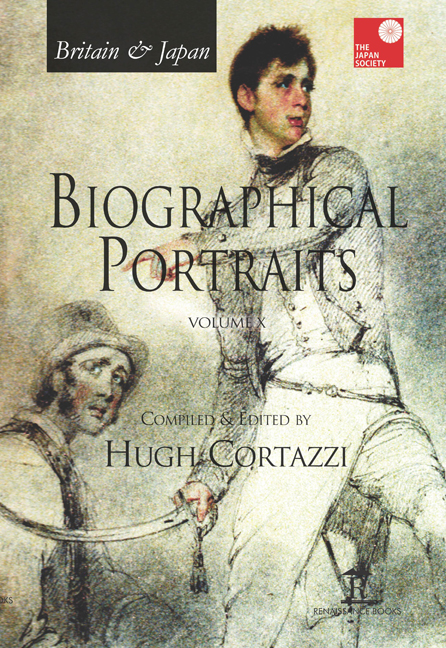Book contents
- Frontmatter
- Dedication
- Contents
- Introduction
- List of Contributors
- Index of Biographical Portraits in Japan Society Volumes
- PART I BRITAIN IN JAPAN
- PART II JAPAN IN BRITAIN
- Select Bibliography of Works in English on Anglo-Japanese Relations [Compiled by Gill Goddard – Retired East Asian Studies Librarian, University of Sheffield]
- Select Bibliography of Works in Japanese on Anglo-Japanese Relations [Compiled by Akira Hirano, SISJAC]
- Index
28 - Sir Fred Warner (1918–1995): Ambassador to Japan, 1972–76
Published online by Cambridge University Press: 07 May 2022
- Frontmatter
- Dedication
- Contents
- Introduction
- List of Contributors
- Index of Biographical Portraits in Japan Society Volumes
- PART I BRITAIN IN JAPAN
- PART II JAPAN IN BRITAIN
- Select Bibliography of Works in English on Anglo-Japanese Relations [Compiled by Gill Goddard – Retired East Asian Studies Librarian, University of Sheffield]
- Select Bibliography of Works in Japanese on Anglo-Japanese Relations [Compiled by Akira Hirano, SISJAC]
- Index
Summary
INTRODUCTION
SIR FRED WARNER was someone of style and originality, with the virtues of the old world and an insatiable interest in the new. His talents would have brought success in many fields, but it was probably not an accident that he chose diplomacy. Those who worked for him, and those with an interest in British Japanese relations should be grateful.
EARLY LIFE AND DIPLOMATIC CAREER
Frederick Archibald Warner was born on 2 May 1918. His father, also Fred Warner, was an officer in the Royal Navy, who died in action in the First World War before Fred, his only son, was born. His mother, who had come from New York against her parents’ wishes, to help the allied war effort before the United States entered the war, brought her son up in the Dorset countryside that Fred loved for the rest of his life. He went first to Wixenford School and then, following in his father's footsteps, to the Royal Naval College, Dartmouth. At the age of eighteen however, instead of entering the Navy, Fred insisted, against all the rules and traditions, that he wanted to go to Oxford. He succeeded in getting a place at Magdalen College in spite of having only three weeks before the exams to learn the Latin then required; either he learned enough to impress the examiners, or his other papers showed what he was capable of, and he was accepted. In 1940, before Fred could take his Final Examination (in PPE), he was called up – although like others in the same position he was awarded a degree. He served in the Navy, ending the War in command of a squadron of fast patrol boats.
Fred Warner joined the Foreign Office in February 1946. One of his early jobs was as the junior member of the British team negotiating the peace treaty with Italy. With an ambassador who took long lunches, a number two who fell ill, and a Foreign Office under great pressure he often found himself taking more responsibility than is usual in a first job. Later he was private secretary to the respected Hector McNeil, Bevin's deputy, who was working on many sensitive post-war issues including Greece and relations with the Soviet Union. Here Fred was alongside Guy Burgess, who had found a way into McNeil's orbit and had access to all the minister's papers.
- Type
- Chapter
- Information
- Britain & Japan Biographical Portraits Vol X , pp. 327 - 332Publisher: Amsterdam University PressPrint publication year: 2016



